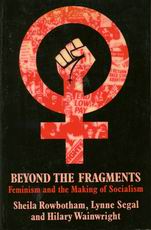
Beyond the Fragments
Feminism and the Making of Socialism
Rowbotham, Sheila; Segal, Lynne; Wainright, Hilary
Publisher: Merlin, Press, London, United Kingdom
Year First Published: {14686 Beyond the Fragments BEYOND THE FRAGMENTS Feminism and the Making of Socialism Rowbotham, Sheila; Segal, Lynne; Wainright, Hilary Merlin, Press London United Kingdom A call for various fractions of the left to unite and work for a socialism through grass-roots activism. 1979 1980 253pp BC14686-BeyondFragments.jpg B Book 0-85036-254-7 Beyond the Fragments, written by three female socialist feminist activists re-evaluates a traditionally male dominated leftist tradition according to a feminist perspective. At the same time, the contributors also consider the contradiction in each of their own personal political backgrounds. The authors argue that socialism needs to incorporate feminism, redefine its priorities, adopt a new approach to theory and consciousness, and re-examine the socialist forms of political organisation. This, they argue, will create an alternate and more inclusive vision of society.
<br>
<br>The authors recommend a changed theoretical approach for leftist organisations. They say groups need to collaborate and develop programs of social change that meets the common needs of all oppressed people so that different constituencies can embrace and lobby for a set of goals. Based on a program of shared goals, different constituences and interest groups can work together against capitalism and the state.
<br>
<br>According to Rowbotham, the Women's Liberation Movement provides an understanding of the subjectivity of oppression; the connection between personal relations and public political organisations and the emotional components of consciousness. Effective social politics must contribute to these understandings, thus the women's movement is central to mobilising a new and loosely tied, democratic socialist movement. Segal emphasises the potentially useful lessons gained from participating in the activities of an open, local group fighting for specific objectives as a model for building leftist unity. Wainwright argues that each social movement must remain autonomous, but generally organise together to achieve wider social ownership and political power. This collaborative movement will allow each group to express conflicting views with each other, while still respecting political differences at a local level.
<br>
<br>[Abstract by Amanpreet Dhami] CX7322 0 true true false CX7322.htm [0xc001a4cde0 0xc00025fa70 0xc0005ce270 0xc000329bf0 0xc000a69950 0xc000aeca20 0xc000c3a7e0 0xc000ca7f50 0xc000ce6db0 0xc000d24fc0 0xc0001a4db0 0xc001b30690 0xc001b311a0 0xc001bbd1a0 0xc000ac8060 0xc0015653b0 0xc00035dc20 0xc0009c3500 0xc0016c8de0 0xc002196e10 0xc002770060 0xc0027c1470 0xc002816120] Cx}
Year Published: 1980
Pages: 253pp ISBN: 0-85036-254-7
Resource Type: Book
Cx Number: CX7322
A call for various fractions of the left to unite and work for a socialism through grass-roots activism.
Abstract:
Beyond the Fragments, written by three female socialist feminist activists re-evaluates a traditionally male dominated leftist tradition according to a feminist perspective. At the same time, the contributors also consider the contradiction in each of their own personal political backgrounds. The authors argue that socialism needs to incorporate feminism, redefine its priorities, adopt a new approach to theory and consciousness, and re-examine the socialist forms of political organisation. This, they argue, will create an alternate and more inclusive vision of society.
The authors recommend a changed theoretical approach for leftist organisations. They say groups need to collaborate and develop programs of social change that meets the common needs of all oppressed people so that different constituencies can embrace and lobby for a set of goals. Based on a program of shared goals, different constituences and interest groups can work together against capitalism and the state.
According to Rowbotham, the Women's Liberation Movement provides an understanding of the subjectivity of oppression; the connection between personal relations and public political organisations and the emotional components of consciousness. Effective social politics must contribute to these understandings, thus the women's movement is central to mobilising a new and loosely tied, democratic socialist movement. Segal emphasises the potentially useful lessons gained from participating in the activities of an open, local group fighting for specific objectives as a model for building leftist unity. Wainwright argues that each social movement must remain autonomous, but generally organise together to achieve wider social ownership and political power. This collaborative movement will allow each group to express conflicting views with each other, while still respecting political differences at a local level.
[Abstract by Amanpreet Dhami]
Subject Headings


